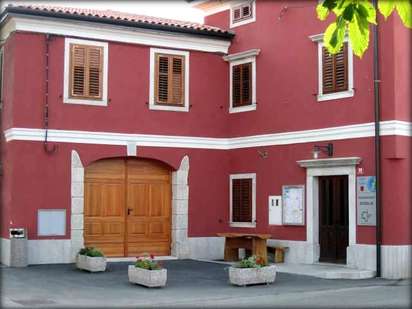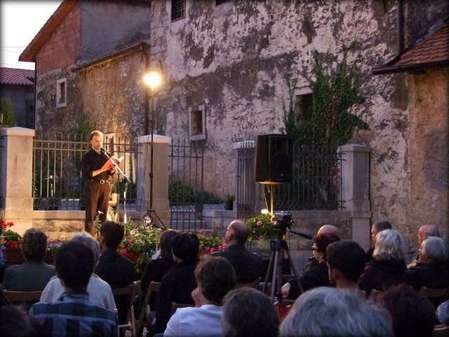
The Bunčetovi Homestead
|
The Bunčetovi Homestead was named after Franc Bonča who married and moved to Dutovlje in 1892 from Črn Vrh above Idrija.
The Mihec family were the first owners of the homestead. Their most wealthy neighbour Tomaž Štok – Kalkoč bought the property from them for his son Andrej who married Antonija Gec from Skopo in 1886 but died after five years. Their marriage was much too short and they had only one daughter – Lidija. One year after Andrej’s death, Antonija married again with Franc Bonča. At that time, the Bunčetovi Homestead already housed a newspaper and tobacco shop. In 1859, the house was rebuilt and renovated into a rather beautiful building with an outbuilding, an inn on the ground floor and residential premises on the first floor. In addition, the house had a beautifully arranged garden where various theatre and singing performances as well as feasts took place at that time, with boules games also being a constant activity. |
Later, Lojze “Lukotov” from Godnje married Lidija and moved to the homestead. The couple had six children, with first two sadly passing away right after birth. At the beginning of World War One, the family moved away from the homestead and Lojze’s brothers and sisters moved in.
In 1920, Josip Tavčar, the son of Mihela, the youngest Lojze’s sister, was born at the Bunčetovi Homestead. Josip was very gifted and has an important place in the history of important people born in Dutovlje. He worked as a playwright, essayist, publicist and professor at the Slovene school in Trieste.
Lojze returned to the Bunčetovi Homestead in 1929 and lived there with his wife and daughter, whose name was Darinka but was called Marija by the locals. They all tried to continue the house tradition. The inn (then the Tavčar Inn) started operating again until it was closed by the Italian fascist government.
During World War Two, Darinka gave birth to son Marko and daughter Branka (also called Rožica) and after the war, her son Slavko was born. Branka who is still alive remembers that after the war, their house was the social and cultural centre of the village. On the ground floor, there was a post office and a store. Between 1947 and 1960, a veneer shop operated in the largest room. On the first floor, there was a hall for dances and parties. We tried to continue the tradition, which is why this room is now used for various lectures and educational events. The other rooms on the first floor were residential and were rented out.
In 1963, Darinka sold the Bunčetovi Homestead to Preskrba, which was a trading company and used the building as a warehouse for the new store, which still operates in the village square, now under the management of the Tuš store chain.
In 1920, Josip Tavčar, the son of Mihela, the youngest Lojze’s sister, was born at the Bunčetovi Homestead. Josip was very gifted and has an important place in the history of important people born in Dutovlje. He worked as a playwright, essayist, publicist and professor at the Slovene school in Trieste.
Lojze returned to the Bunčetovi Homestead in 1929 and lived there with his wife and daughter, whose name was Darinka but was called Marija by the locals. They all tried to continue the house tradition. The inn (then the Tavčar Inn) started operating again until it was closed by the Italian fascist government.
During World War Two, Darinka gave birth to son Marko and daughter Branka (also called Rožica) and after the war, her son Slavko was born. Branka who is still alive remembers that after the war, their house was the social and cultural centre of the village. On the ground floor, there was a post office and a store. Between 1947 and 1960, a veneer shop operated in the largest room. On the first floor, there was a hall for dances and parties. We tried to continue the tradition, which is why this room is now used for various lectures and educational events. The other rooms on the first floor were residential and were rented out.
In 1963, Darinka sold the Bunčetovi Homestead to Preskrba, which was a trading company and used the building as a warehouse for the new store, which still operates in the village square, now under the management of the Tuš store chain.
|
The Frančeškin family were the last tenants in the Bunčetovi Homestead. A few years ago, the Municipality of Sežana bought the property and completely renovated the collapsing building.
During the last renovation, the outbuilding was demolished and the extra room was used to extend the backyard for various purposes. In 2009, the Pepa’s Karst Garden was added to the Bunčetovi Homestead and is the pride of the village. The building now houses the Dutovlje Local Community as well as the Dutovlje Tourist and Information Centre. On the ground floor, there is a large room in the Karst style intended for various social events. The rooms on the first floor are mostly used by the Dutovlje Local Community and the Kras Tourist Association, with the exception of the large hall that was renovated and equipped in 2012 for various lectures and educational events. The members of the Kras Tourist Association and the Dutovlje TIC ensure that there is always something going on in the rooms of the Bunčetovi Homestead. We hold interesting educational and children workshops, occasional gatherings, fairs for herbs and Karst culinary delights, Friday nights, concerts, plays and other social events. |
Sources:
Albin KJUDER, Historical Mosaic of the Primorska Region with emphasis on the Upper Karst, 1956-60, Tomaj
Verbal source: Branka Sulčič, Dutovlje
Photographs: Miloš Stankovič
Albin KJUDER, Historical Mosaic of the Primorska Region with emphasis on the Upper Karst, 1956-60, Tomaj
Verbal source: Branka Sulčič, Dutovlje
Photographs: Miloš Stankovič

